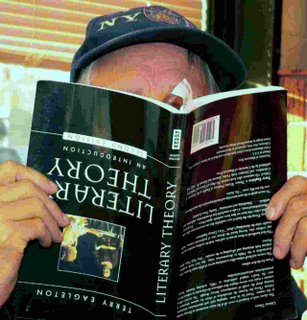Is Amazon (Dot) Com So 'The Establishment' in 2007 -- "It's Boring All of Us?"
The Scotsman, on the occasion of Amazon(dot)com's 10th birthday two years ago, nearly extolled Amazon's UK performance after a mere 3 years on the ground delivering to the Brits and Scots as well as Wales.
Scribes who, for nearly a decade, reached post-Christmas heights each New Year bitching about how customers' online orders were botched by Amazon, had already turned their sights upon online banking identity theft. Had they just dropped the poison pen and moved on because it became boring?
A quote from the Time text below:
"Books . . . are among the most highly databased items on the planet. The wholesalers even had CD-ROMs listing them," Amazon CEO Bezos.
Amazon the Pre-Teen
Boring? Books? P2P music downloads? Whatever. Who would have guessed that by today's 12th anniversary of Amazon's IPO start-up, commentators everywhere would find E-commerce so boring a theme that online shopping was barely discussed as bankruptcy loomed for the 3rd largest distributor of books on pallets to the retail outlets, viz AMS? It is as if Amazon competition in the bookbuying business is such a given, we cannot fathom that old-style distributors have not completely factored in Amazon into their daily equation of hauling books in and out of the warehouse.
If you forget history, you're forced to re-live it.
Cut and Pasted from TIME (dot) COM
11 Years Ago
Amazon launchs it's first IPO on Wallstreet
In May 1996, Amazon landed on the front page of the Wall Street Journal. The story did two things: it introduced Amazon to a whole new stream of customers, and it caught the attention of rivals like Barnes & Noble and Borders Group, which hadn't yet moved online. Barnesandnoble.com would appear a year later--just before Amazon's initial public offering, which went off at a modest $18 a share. Never mind that the celebrated venture-capital firm Kleiner Perkins Caufield & Byers was its biggest institutional investor before the ipo. Wall Streeters were afraid of the threat posed by the giant Barnes & Noble, whose national network of bookstores looked unbeatable, prompting George Colony, president of Forrester Research, a prominent technology-analysis firm, to pronounce the company "Amazon.toast." Other naysayers referred to it as "Amazon.org"--".org" being a domain name reserved for nonprofit companies. But Barnesandnoble.com did nothing to stall Amazon's amazing sales.
8 Years Ago
Much of the Silicon Valley/Wall Street/media complex believes the commodification of online retailing will lay their company to waste. Amazon the Web's golden child, darling of NASDAQ day traders who raise its market cap even faster than the company bleeds money, is also Amazon the avatar of all that may be ephemeral and fraudulent about the dotcom revolution.
7 Years Ago
Marcus, who joined Amazon in '96, recalls learning Web coding on the fly in order to get his reviews online. Kerry Fried sardonically references "my assistant" to refer to her endless clerical duties. Almost every Amazonian spends half his time each December wrapping packages and manning customer-service lines. "It doesn't matter what you've done before and what you're going to do later," says Moe. "You figure it out as you go along."
That even goes for where you sit. Amazon offices are scattered across Seattle: the flagship Art Deco Pacific Medical Center, the Pike Street skyscraper, the original Columbia building and so on. Stunning mountain-flanked views of Lake Washington and Puget Sound are the only luxury the spartan corporate aesthetic allows. Employees are crammed two to a bare-walled office and work at Bezos-designed desks made of old doors with legs stuck on them (design director Helen Owen bets me lunch that she will still have a door-desk in five years, even if Amazon flourishes).
"We're constantly told not to get too attached to our office," says Marcus, who has moved nine times in three years.
The Brainchild
Some 14/15 Years Ago
Bezos recalls, "I'm sitting there thinking we can be a complete first mover in e-commerce." He researched mail-order companies, figuring that things that sold well by mail would do well online. He made a list of the Top 20 mail-order products and looked for where he could create "the most value for customers." Value, in his equation, would be something customers craved: selection, say, or convenience or low prices. "Unless you could create something with a huge value proposition for the customer, it would be easier for them to do it the old way," he reasoned. And the best way to do that was "to do something that simply cannot be done any other way."
And that's what ultimately led to books. There weren't any huge mail-order book catalogs simply because a good catalog would contain thousands, if not millions of listings. The catalog would need to be as big as a phone book--too expensive to mail. That, of course, made it perfect for the Internet, which is the ideal container for limitless information.
Bezos needed to learn the book business fast. Fate was his handmaiden: the American Booksellers Association's annual convention was set for the very next day in Los Angeles. He flew out and spent the weekend roaming the aisles and taking a crash course in the business. Everything he learned encouraged him. The two big wholesalers for books were Ingram and Baker & Taylor. "So I went to their booths and told them I was thinking of doing this."
"Books, it turns out, are among the most highly databased items on the planet. The wholesalers even had CD-ROMs listing them. It seemed to Bezos as if all the stuff "had been meticulously organized so it could be put online."
Bezos realized he desperately wanted to start his own online bookstore. First he talked it over with MacKenzie. She too had graduated from Princeton, but six years after him; they met at Shaw, where she worked as a researcher. An English-literature major at the university, she had been novelist Toni Morrison's assistant and now had begun a novel of her own. MacKenzie was all for the adventure.
Between Bezos's Garage and His Wallstreet Début
The most important person Bezos hired was probably the first: Shel Kaphan, a brilliant programmer in Santa Clara, Calif., and veteran of a dozen start-ups, many of them, in fact, failures. Bezos persuaded him, over the course of a few months, to join his company in Seattle.
Back in the winter of '95-'96
To save money, Bezos went to Home Depot and bought three wooden doors. Using angle brackets and 2-by-4s, he hammered together three desks, at a cost of $60 each. (That frugality continues at Amazon to this day; every employee sits behind a door desk.)
. . On July 16, 1995, Amazon.com opened its site to the world . .
IN 2006, Amazon.com experience it's biggest Christmas buying spree yet:
See the Wednesday, 14 January Post HERE on the latest analysis.


No comments:
Post a Comment